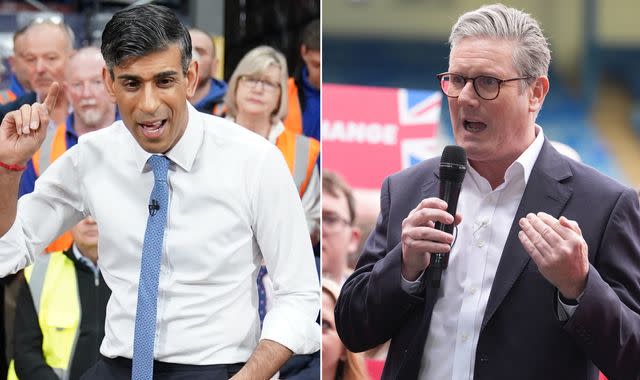Rishi Sunak and Sir Keir Starmer to go head to head in their first televised leaders' debate of the general election

Rishi Sunak and Sir Keir Starmer will go head to head in their first televised debate of the general election on 4 June.
The two leaders will appear on ITV at 9pm for an hour, the channel has announced.
Sunak v Starmer: The ITV Debate will be moderated by journalist Julie Etchingham and will take place live in front of a studio audience.
Follow live general election updates
The programme is the first in a series of clashes set to be held by various broadcasters.
Sky News is planning its own leaders' event in the key battleground seat of Grimsby and Cleethorpes, where we have been regularly reporting on the issues facing local residents.
Voters will be given the opportunity to put questions directly to the leaders.
Labour leader Sir Keir has agreed to attend, while negotiations are ongoing with Mr Sunak's team.
A spokesperson for the Conservatives said: "Rishi Sunak would be delighted to travel Grimsby to take part in Sky News leaders' event and answer questions from voters, on the condition that he and Keir Starmer take those questions on stage together.
"This will give viewers the best opportunity to see the clear choice the country faces at this election."
Televised leader debates have been a staple of US politics since the 1950s but the first TV debates in the UK did not take place until the 2010 general election when Gordon Brown, David Cameron and Nick Clegg took part in three.
Read more:
Labour extends lead over Tories in exclusive poll for Sky News
Since then, they have been a key part of general election campaigns, with Theresa May in 2017 being the only leader refusing to take part since 2010 - a decision she later told Sky News she regretted.
The decision to hold the debate in Grimsby comes after the seat turned Conservative in 2019 for the first time since the end of the Second World War.
Many people at the time felt a cultural rift with the Labour Party.
Grimsby has now been combined with Cleethorpes, where the Tories have been in power since 2010, but support is fading.
Cleethorpes has been a bellwether seat since its formation in 1997, backing the largest party in Westminster in all seven elections since then.
The constituency contains a rural conservative base, as well as urban voters, who in more recent years backed the promises of levelling up and Brexit offered by the Conservatives.
The complex composition of this new constituency means it is shaping up to be a key battleground.

 Yahoo News
Yahoo News 
